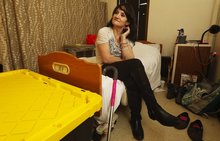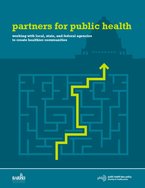Found 17 resources.
0
0
0

Founded in 1995 as Project Women, Family Scholar House (FSH) provides comprehensive, holistic services for disadvantaged single parents, their children, and foster alumni. The nonprofit seeks to end the cycle of poverty and transform communities by empowering families and youth to succeed in education and life-long self-sufficiency. FSH provides supportive housing, educational programming, and participant advocacy to help families gain independence.
Topics: Dual-generation, Early childhood, Education, Homelessness, Housing, Low-income, Partnerships, Place-based, Post-secondary, South, Stability
0
0
0

A D.C. housing development serves as a refuge for grandparents raising young children. Is it a model for the rest of the country?
Topics: Child welfare, Dual-generation, East Coast, Family engagement, Low-income, Place-based, Seniors, Stability, Youth
0
0
0

When homeless people get released, their issues combined with living on the street will usually land them back in emergency rooms, costing hospitals like Harborview Medical Center — which operates on a thin margin — time and money. One solution is a type of respite program that provides short-term care to homeless patients who are too sick to be on the streets or in a shelter, but not sick enough to continue to take up a hospital bed.
Topics: Health, Homelessness, Housing, Pacific Northwest, Partnerships, Place-based, Preventative care, Stability
0
0
0
With collectively more than 100 years of policy expertise and values-based leadership between us, Ascend at the Aspen Institute and the Housing Opportunity and Services Together initiative at the Urban Institute partnered to develop a set of recommendations on how to harness assisted housing and public-private housing partnerships for better outcomes for families.
Topics: Dual-generation, Early childhood, Education, Family engagement, Health, Housing, Low-income, Place-based, Research, Stability
0
0
0
Most states use an education funding formula to allocate state and local dollars to school districts. Most funding formulas attempt to account for student poverty, among other factors, in distributing funds. But there are several ways to count low-income students and even more ways to tie dollars to these student counts.
Topics: Child welfare, Education, Legislation & Policy, Low-income, Place-based, Research, Stability, Youth
0
0
0
Treating opioid use disorder among homeless families can reduce hepatitis C transmission, infant drug withdrawal, and overdose, which is the leading cause of death among people experiencing homelessness. Although office-based treatment is effective for homeless patients, homelessness (especially among families) creates barriers to office-based opioid treatment, such as stigma, child care needs, or distance from an office site. To reduce barriers to treatment, the Family Team at the Boston Health Care for the Homeless Program added a shelter-based opioid treatment program to its outreach...
Topics: Health, Homelessness, Housing, Place-based, Preventative care, Safety, Stability, Substance abuse
0
0
0
After decades of sprawl and suburban dominance, U.S. cities are experiencing rebounding populations, growing employment, and new public and private sector investments in places that are walkable, transit-oriented, and support diverse people and amenities. But we know that the benefits of these trends are not equally distributed, presenting an urgent opportunity for local and regional leaders to advance place-led development that produces better economic outcomes for more people in more places.
To help deliver on that imperative, the Metropolitan Policy Program at Brookings launched the...
Topics: Community development, Housing, Partnerships, Place-based, Safety, Stability
0
0
0
CLPHA’s Housing Is Initiative is engaged in a number of cross-sector activities focused on developing partnerships, facilitating a community of practice, resource development, promoting best practices, online collaboration, policy and advocacy, and training and education. Read about recent activities in this Fall Update.
Topics: Child welfare, CLPHA, Community development, Cost effectiveness, Data sharing, Early childhood, Education, Family engagement, Funding, Health, Homelessness, Housing, Low-income, Medicaid / Medicare, Mental health, Partnerships, Place-based, Post-secondary, Research, Stability, Substance abuse, Workforce development, Youth
0
0
0
Although the rental assistance programs varied, key themes emerged, including (1) most programs, recognizing the impact of housing stability on health outcomes, targeted populations served by state or local health and human services programs; (2) most programs served a growing number of households over time; (3) funding generally increased over time and most of it came from general revenue; and (4) programs involved collaboration between the housing and health and human services agencies to ensure clients’ needs were comprehensively met.
Topics: Funding, Health, Housing, Legislation & Policy, Low-income, Partnerships, Place-based, Research, Stability
0
0
0
The King County Housing Authority (KCHA), in partnership with the Highline School District and the nonprofit social service organization Neighborhood House, launched the Student and Family Stability Initiative (SFSI) pilot program in 2013 to provide housing and employment supports to homeless and unstably housed families with children enrolled in Highline elementary schools. In 2016, KCHA contracted with the Urban Institute (Urban) to conduct a process and outcome evaluation of the program’s first three pilot years. This evaluation documents how SFSI works, who it serves, and how well it...
Topics: Attendance, Dual-generation, Education, Family engagement, Housing, Low-income, Pacific Northwest, Partnerships, Place-based, Research, Stability, Workforce development, Youth
0
0
0
The Conway Center is a project of a nonprofit housing and services organization, So Others Might Eat, and a federally qualified health center, Unity Health Care, in Washington, DC. This $90 million community development initiative will colocate employment training, health care services, and affordable housing under one roof in Ward 7, an area of DC experiencing high poverty and unemployment, and poor health outcomes. The partnership aims to improve access to affordable rental housing, increase livable-wage job attainment, and connect residents to high-quality health care services. Although...
Topics: Community development, Cost effectiveness, Food insecurity, Health, Housing, Low-income, Medicaid / Medicare, Partnerships, Place-based, Stability
 Shared by Housing Is
on Jul 13, 2018
Shared by Housing Is
on Jul 13, 2018 0
0
0
This guide is intended to provide information to public health department staff and advocates about the many public agencies that make policy decisions and implement projects related to the physical environment.
Topics: Child welfare, Community development, Education, Exercise, Green, Health, Housing, Legislation & Policy, Place-based, Safety, Smoke-free, Stability, Substance abuse, West Coast
 Shared by Housing Is
on Jul 13, 2018
Shared by Housing Is
on Jul 13, 2018 0
0
0

It adds to the growing body of evidence that addressing homelessness saves money elsewhere.
Topics: Cost effectiveness, Criminal justice, Health, Healthy homes, Homelessness, Housing, Legislation & Policy, Place-based, Preventative care, Research, Stability, West Coast
 Shared by Housing Is
on Jul 5, 2018
Shared by Housing Is
on Jul 5, 2018 0
0
0
Topics: Community development, Cost effectiveness, Housing, Legislation & Policy, Low-income, Metrics, Partnerships, Place-based, Research, Stability, Workforce development
 Shared by Housing Is
on Jul 5, 2018
Shared by Housing Is
on Jul 5, 2018 0
0
0

Why do some neighborhoods appear able to launch effective local improvement initiatives, while others are more hampered by fragmentation and mistrust? Why can some communities mobilize diverse constituencies to influence public policy, while others cannot? Answers to these questions may be found in the specific patterns of collaboration that form among community organizations, and between these groups, schools, public agencies, and elected officials, according to MDRC, a preeminent social-policy research organization.
Topics: Asset building, Child welfare, Community development, Data sharing, Dual-generation, Education, Family engagement, Funding, Health, Housing, Legislation & Policy, Low-income, Metrics, Midwest, Mobility, Out-of-school time, Partnerships, Place-based, Preventative care, Research, Safety, Stability, Workforce development, Youth
0
0
0
Anchor institutions can provide invaluable expertise, as well as serve as reliable third party entities, especially in our resource-constrained environment. Chicago Housing Authority and the University of Chicago describe how their partnership has increased their efforts and made it more efficient.
Cassandra Brooks, Education Specialist, Chicago Housing Authority
Denali Dasgupta, Researcher, Chapin Hall, University of Chicago
Nick Mader, Senior Researcher, Chapin Hall, University of Chicago
Topics: CLPHA, Education, Housing, Low-income, Midwest, Partnerships, Place-based, Research, Stability
 Shared by CLPHA Admin
on Jan 3, 2018
Shared by CLPHA Admin
on Jan 3, 2018 0
0
0
In Tacoma, Washington, and other U.S. cities, housing departments are collaborating with school districts to give low-income and homeless students a leg up.
Topics: CLPHA, Education, Housing, Pacific Northwest, Partnerships, Place-based, Stability
 Shared by Abra Lyons-Warren
on Sep 7, 2017
Shared by Abra Lyons-Warren
on Sep 7, 2017 


